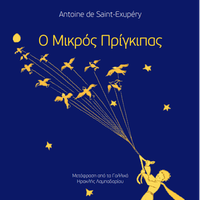18//
18//
18//
18//
Ομικρός πρίγκιπας, διασχίζοντας την έρημο, συνάντησε ένα μονάχα λουλούδι.
Le|prince|en traversant|le|désert|il a rencontré|une|seule|fleur
Omikron||überquerend||Wüste||||
The Little|prince|crossing|the|desert|he met|one|only|flower
O pequeno príncipe, atravessando o deserto, encontrou uma única flor.
The little prince, crossing the desert, met a single flower.
Le petit prince, traversant le désert, rencontra une seule fleur.
Ένα λουλούδι με τρία πέτα, ένα λουλούδι ασήμαντο… «Καλημέρα» είπε ο μικρός πρίγκιπας.
Un|fleur|avec|trois|pétales|une|fleur|insignifiante|Bonjour|dit|le|petit|prince
A|flower|with|three|petals|a|flower|insignificant|Good morning|said|the|little|prince
||||Blütenblätter||||||||
Uma flor com três pétalas, uma flor insignificante... "Bom dia", disse o principezinho.
A flower with three petals, an insignificant flower... "Good morning," said the little prince.
Une fleur avec trois pétales, une fleur insignifiante… «Bonjour» dit le petit prince.
«Καλημέρα» είπε το λουλούδι.
Bonjour|a dit|le|fleur
Good morning|said|the|flower
"Good morning," said the flower.
«Bonjour» dit la fleur.
«Πού βρίσκονται οι άνθρωποι;» ρώτησε ευγενικά ο μικρός πρίγκιπας.
Où|sont|les|gens|demanda|poliment|le|petit|prince
Where|are|the|people|asked|politely|the|little|prince
"Onde estão as pessoas?", perguntou o principezinho com delicadeza.
"Where are the people?" asked the little prince politely.
«Où sont les gens ?» demanda poliment le petit prince.
Το λουλούδι, μια μέρα, είχε δει να περνάει ένα καραβάνι: «Οι άνθρωποι; Νομίζω ότι υπάρχουν έξι-επτά.
Le|fleur|un|jour|avait|vu|à|passe|un|caravane|Les|gens|Je pense|que|il y a||
The|flower|one|day|had|seen|to|pass|a|caravan|The|people|I think|that|there are||
|||||||||Karawane||||||sechs|sieben
A flor, um dia, tinha visto passar uma caravana: "As pessoas? acho que são seis ou sete.
The flower, one day, saw a caravan passing by: "The people? I think there are six or seven.
La fleur, un jour, avait vu passer un caravan: «Les gens ? Je pense qu'il y en a six ou sept.
Τους είχα δει πριν χρόνια.
Les|j'avais|vus|il y a|des années
Them|I had|seen|before|years
Vi-os há muitos anos.
I had seen them years ago.
Je les avais vus il y a des années.
Μα δεν ξέρεις ποτέ πού να τους βρεις.
mais|ne|sais|jamais|où|à|les|trouves
But|not|you know|ever|where|to|them|find
Mas nunca se sabe onde os encontrar.
But you never know where to find them.
Mais on ne sait jamais où les trouver.
Τους παρασέρνει ο άνεμος.
Les|emporte|le|vent
Them|sweeps away|the|wind
|zieht weg||
São levados pelo vento.
The wind carries them away.
Le vent les emporte.
Δεν έχουν ρίζες κι αυτό τους δυσκολεύει πολύ».
ne|ont|racines|et|cela|les|rend difficile|beaucoup
They|have|roots|and|this|them|makes it difficult|very
||Wurzeln||||schwierig machen|
Não têm raízes e isso torna as coisas muito difíceis para eles".
They have no roots and that makes it very difficult for them."
Ils n'ont pas de racines et cela leur complique beaucoup la vie.
«Αντίο» είπε ο μικρός πρίγκιπας.
Au revoir|dit|le|petit|prince
Goodbye|said|the|little|prince
"Adeus", disse o principezinho.
"Goodbye," said the little prince.
«Au revoir» dit le petit prince.
«Αντίο» είπε το λουλούδι.
Au revoir|dit|le|fleur
Goodbye|said|the|flower
"Goodbye," said the flower.
«Au revoir» dit la fleur.
SENT_CWT:AFkKFwvL=2.19 PAR_TRANS:gpt-4o-mini=1.58 SENT_CWT:AFkKFwvL=2.29 PAR_TRANS:gpt-4o-mini=2.24
en:AFkKFwvL fr:AFkKFwvL
openai.2025-02-07
ai_request(all=15 err=0.00%) translation(all=12 err=0.00%) cwt(all=86 err=2.33%)

